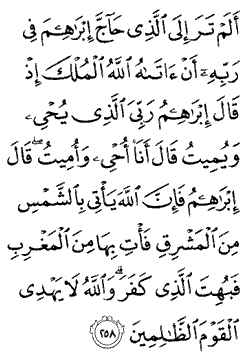Living The Quran
From Issue: 956 [Read full issue]
Creative Power
Al-Baqarah (The Cow) Sura 2: Verse 258
 "Are you not aware of him who argued with Abraham regarding his Lord, because God had granted him kingship? Abraham said: 'My Lord is He who gives life and causes death.' He answered: 'I grant life and deal death.' Said Abraham: 'God causes the sun to rise from the East; cause it then to rise from the West.' Then the unbeliever was dumbfounded. God guides not the tyrants."
"Are you not aware of him who argued with Abraham regarding his Lord, because God had granted him kingship? Abraham said: 'My Lord is He who gives life and causes death.' He answered: 'I grant life and deal death.' Said Abraham: 'God causes the sun to rise from the East; cause it then to rise from the West.' Then the unbeliever was dumbfounded. God guides not the tyrants."
The debate between Abraham and the king sets out the distinction between earthly and divine power, and introduces the concept of zulm, which means wrong, but is particularly associated with wrong in the sense of tyranny and corruption. This argument with the king refers us back to the subject of leadership, the theme running through the preceding passages. Abraham makes a statement of belief: 'My Sustainer is He who grants life and deals death.' In response, the king makes a statement of fact: 'I too grant life and deal death.' What is the distinction here? Certainly, kings, emperors and governments command the power of life and death over people. They can empower society to flourish, or they can cause devastation through war. They can act according to law, even according to God's guidance, or they can bend the law, moral or human, to serve their will and ends. They can ensure that people get the resources they need to sustain life, or they can misappropriate or withhold these resources. But, however much power an earthly ruler has, it is not the creative power of the Almighty, the power to call the universe into existence, to cause the laws of nature to operate and to sustain them endlessly without effort, as explained in the verse of the Throne.
Ultimately, all earthly powers are subservient to and derivative from the creative power of the Almighty. And the point of understanding this distinction is that kings, emperors and governments are just as much in need of God consciousness, of abiding by the limits and balance of God's guidance, as any individual. Recognising the limits of their power, recognising humility before the creative, sustaining power of God and God's ultimate judgement over all human beings is as necessary to kings as to paupers. No accumulation of and command over earthly power, power over nations and their people, exonerates or relieves rulers from responsibility if they do wrong and are guilty of zulm.
It is not only rulers who have to use their judgement. Citizens too have the right to judge how rulers use their power, for everyone has a duty to oppose and seek to eradicate the misuse of power, the tyranny of oppression and persecution which is a demonstration of earthly power over life and death.
Compiled From:
"Reading the Qur'an: The Contemporary Relevance of the Sacred Text of Islam" - Ziauddin Sardar, pp. 184, 185